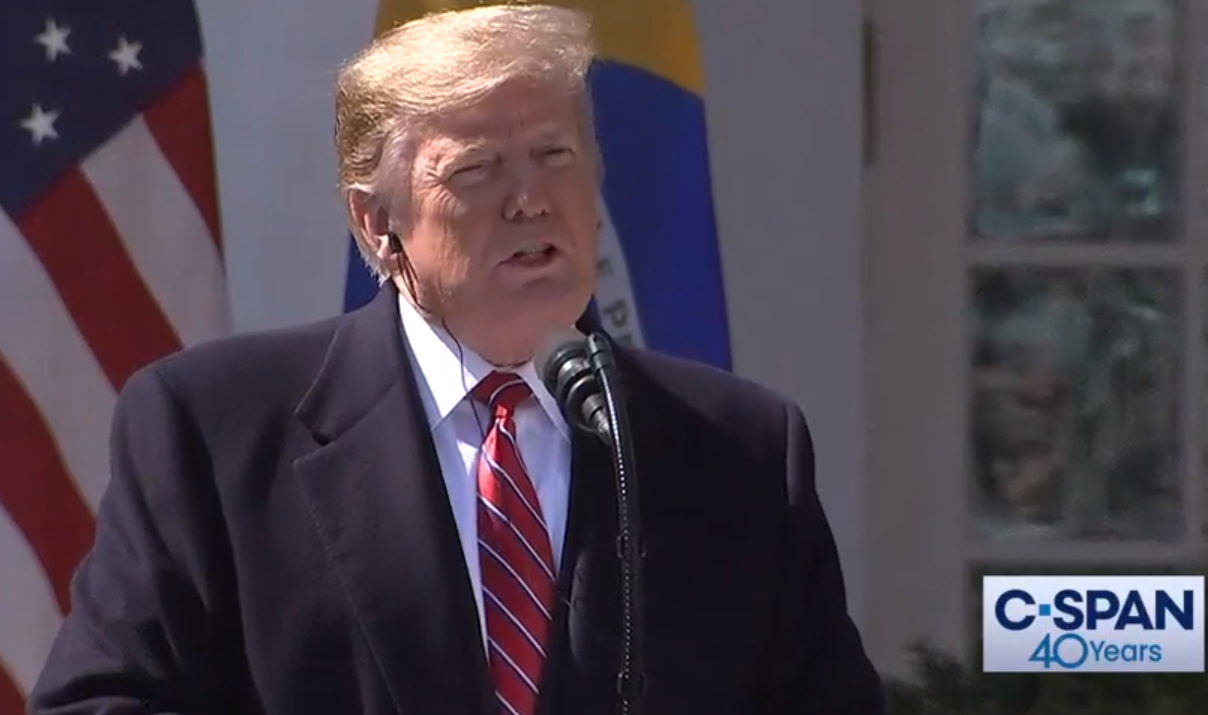Trump Accuses Social Media of Dangerous Collusion to Censor Conservatives

The smarter way to stay on top of broadcasting and cable industry. Sign up below
You are now subscribed
Your newsletter sign-up was successful
President Donald Trump took some time out of a joint press conference with Brazilian President Jair Bolsonaro Tuesday (March 19) to renew his attacks on social media censoring conservative speech. In this case, he called it dangerous collusion and adding in traditional media as colluders in trying to undercut his presidency.
The issue surfaced Monday after Rep. Devin Nunes (R-Calif.) sued Twitter for $250 million over critical third-party posts he said Twitter allowed because of political bias. It also follows news Sen. Josh Hawley (R-Mo.) took aim at Big Tech and its liability protections.
Asked if, given those developments, the President would also support taking a look at the liability protections (the Sec. 202 carveout from the Communications Decency Act) for social media platforms, which relieves the Facebooks and Twitters of the world from liability for third-party content posted on their platforms, the President said definitely so, and then some:
"Something has to be done," he said, taking time to take shots at The Edge.
He suggested that Twitter, one of his favorite communications media, is censoring content.
Related: Barr Signals Silicon Valley Giants Deserve Scrutiny
"I have many, many followers on Twitter and it's different than it used to be," he said. "Things are happening. Names are taken off. People aren't getting through. you've heard the same complaints," he said to his questioner, a reporter from the conservative outlet Daily Caller.
The smarter way to stay on top of broadcasting and cable industry. Sign up below
"It seems to be if they are conservative, if they're Republicans, if they are a certain group, there's discrimination. I see it absolutely on Twitter, and Facebook and others," though he said he focused on "the one platform [Twitter]."
He said he has "way over 100 million followers on various platforms and thus gets to see "what's going on, and it's not good."
He used the term "collusion" repeatedly, saying the term was often used loosely, but added: "I will tell you that there is collusion with respect to that [social media censorship]. Something has to be going on when you get the back office statements made by executives at the various companies and you see the level of, in many cases, hatred they have for a certain group of people that happened to be in power, that happened to have won the election. You say that's really unfair. So, something's happening with those groups of folks running Facebook and Google and Twitter and I do think we need to get to the bottom of it. It's collusive and it is very, very fair to say we have to do something about it."
Related: Conservative Google Employees Don't Feel the Opinion Diversity Love
Then he turned to "fake news," saying the network broadcasts were also part of the media stacked against him and praising Bolsonaro for also talking about fake news, saying he was "very proud" to hear him use the term.
The President said social media censorship was a "very, very dangerous situation" and should be "looked at very closely."
Facebook CEO Mark Zuckerberg has told some Republican members of Congress worried about the same issue that he understands their concern about a liberal bias in Silicon Valley, but that he does not think it is institutionalized, and certainly not at his company.
Related: Reps Square Off Over Online Censorship
It is hardly the President's first volley at The Edge.
Back in August, the President promised to get to the bottom of what he said was Google's rigging of search results to highlight "fake news" stories from the liberal media.
That came only a few weeks after he threatened to investigate Twitter over "shadow banning" conservative prominent Republicans. That appeared to be a reaction to conservative group Project Veritas' undercover video purporting to have uncovered such "shadow banning" of conservative political thought by Twitter, based on a conversation with someone identified as a former Twitter software engineer recorded in a causal setting without his knowledge.
Contributing editor John Eggerton has been an editor and/or writer on media regulation, legislation and policy for over four decades, including covering the FCC, FTC, Congress, the major media trade associations, and the federal courts. In addition to Multichannel News and Broadcasting + Cable, his work has appeared in Radio World, TV Technology, TV Fax, This Week in Consumer Electronics, Variety and the Encyclopedia Britannica.

